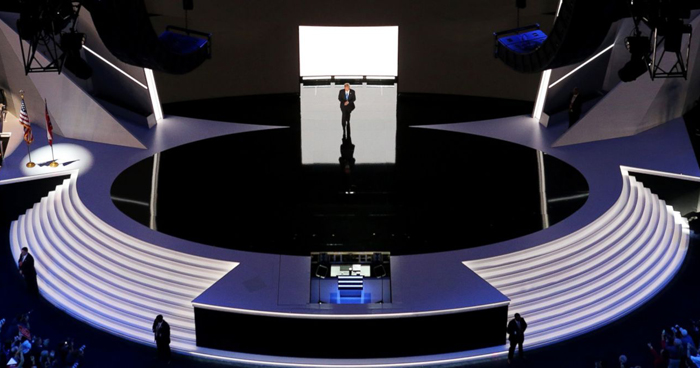In these extraordinary times we should not be jettisoning our extraordinary people.

The champion of ordinary America makes his entrance at the Republican National Convention, 2016. PHOTO ABC News (US)
There’s a story going round that 2016 was a year for ordinary folk, when your average bloke and his missus made a stand for things they hold dear.
We’ve seen the global events of Brexit and the elevation of Donald Trump. In our own region, Filipinos elected a populist ex-policeman as president and huge street protests in Seoul and Jakarta forced governments into retreat. And Australia resurrected Pauline Hanson.
It’s true that a lot of the disquiet around these events is a result of people and communities having long-standing living and working patterns disrupted by changes imposed from outside.
In this familiar scenario, frustration builds over years as one impost is followed by another. Jobs and services once taken for granted disappear, and new technology’s promise of empowerment instead brings impotence and loss of control.
It’s been said that the Brexit and US election outcomes showed expert pollsters and pundits out of touch with voters’ discontent, an idea that slotted nicely into the winning narratives.
The sales pitch of the campaigns by both Donald Trump and the UK Brexit leaders, Nigel Farage and Boris Johnson, was that they would come in their shining armour to give hope to ordinary people, who had been dudded by a cabal of elitists.
By “elitist”, they mean someone who cements personal privilege by putting down ordinary people and robbing them blind. In this latter-day form of class warfare, the assault on privilege is driven not by the workers and intellectuals of old, but by some of the richest among us.
Here’s how it works. Many people are affected by envy of others, so you tease out that envy by conjuring up an elite that exploits ordinary people, stealing their rights and wealth. You brand your opponents as elitist, loudly and aggressively enough for voters to overlook your own rich, privileged situation. This is the politics of envy, 2016-style, and the Brexit and Trump successes indicate that it can be a devastatingly effective weapon.
This brand of envy politics did not appear overnight. For decades it has been used to manipulate discontent for political gain, in many different policy areas. Today it’s especially prevalent in debates around energy and climate policy.
All major scientific institutions around the world and a big majority of scientists, supported by overwhelming evidence, testify that man-made climate change is real and already happening. That makes it every politician’s duty to do all they can to stop it, such as by cutting carbon emissions.
Many politicians object to such an imperative – including some in government in Australia – and rationalise their inaction by branding climate scientists as elitists amusing themselves by scaring us.
So these clever, highly-trained, dedicated people, from a profession honoured for its scrupulously objective standards, are branded as shallow know-nothings at best, or at worst lying charlatans, taking money from the public while deceiving it.
Then we have the odd phenomenon of Australian coal mining executives and their political cheerleaders claiming the high moral ground on behalf of India’s poorest communities, which they say are in desperate need of our cheap, high-quality thermal coal.
The same individuals, with active support from federal cabinet including (to his shame) the PM, have wasted no opportunity to bash Australia’s sunrise industries of wind and solar power – in defiance of international obligations, economists’ advice and sensible business planning.
Just like scientists warning of a changing climate or economists warning of the crippling cost of delayed action, advocates for renewable energy or better climate policy are represented as elitists.
This humble scribe is one such advocate, and on the odd occasion when I’ve been assigned membership of this illusory elite I find myself wondering if I’ve missed something. It might be flattering if it wasn’t so patently, ridiculously false.
Anti-elitism becomes dangerous when it reaches the point of rejecting expert advice. In the early stages of a long journey through uncharted waters, you really do need to keep the navigators on board.
